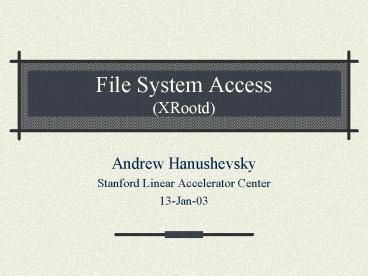File System Access XRootd - PowerPoint PPT Presentation
1 / 20
Title:
File System Access XRootd
Description:
Multi-protocol authentication support. Scalable authorization. Jauuary 13, 2003 ... Compatible Protocol. Allows transparent use of rootd & xrootd. Multi-Streaming ... – PowerPoint PPT presentation
Number of Views:76
Avg rating:3.0/5.0
Title: File System Access XRootd
1
File System Access(XRootd)
- Andrew Hanushevsky
- Stanford Linear Accelerator Center
- 13-Jan-03
2
Goals
- High Performance File-Based Access
- Scalable
- Extensible
- Mass Storage integration
- Flexible Security
- Dynamically Configurable
- Rootd Compatable
3
Achieving High Performance
- Multi-threaded server
- Ability to run multiple servers on one host
- MRU polling
- Last active connections serviced first
- Sticky sockets
- Socket/thread bound for active connections
- Using high-performance oofs layer
- Unlocked I/O, sync reduction, file descriptor
partitioning
4
Achieving Scalability
- Socket multiplexing
- One connection per client/host
- Requires stream id protocol extensions
- Dynamic Load Balancing
- Requires client redirection protocol extensions
- Using scalable oofs layer
- File reuse, idle closeouts, cached file system
5
Achieving Extensibility
- Opaque Information Protocol
- Protocol extension allows client to relay
outboard information to server - Messaging interface
- Cache group
- Request priority
- Other things we havent thought of yet
6
Achieving MSS Integration
- Using oofs layer
- Already integrates with almost any MSS
- No brainer
7
Achieving Flexible Security
- Negotiated Security Protocol Extensions
- Allows client/server to agree on protocol
- E.g., Kerberos, GSI, AFS Kerberos, etc.
- Using oofs layer
- Multi-protocol authentication support
- Scalable authorization
8
Achieving Configurability
- Servers must come up/down without harm
- Part of dynamic load balancing
- Requires client retry extension
9
Achieving Compatability
- Client sensitive to server version number
- Rootd servers default to base TNetFile class
- XRootd servers use derived TNetFile class
- Server requires client to turn on extensions
- Base TNetFile class restricted to rootd ops
- Derived TNetFile enables extensions
- Multi-streaming, Redirection, Request Deferral,
Generic Security, Opaque Information
10
xrootd Architecture
application
Database Protocol Layer
xrootd
Filesystem Logical Layer
oofs
Filesystem Physical Layer
ooss
Filesystem Implementation
mss
xfs
11
Some Details
- Compatible Protocol
- Allows transparent use of rootd xrootd
- Multi-Streaming
- Allows multiple files per connection
- Cache File System
- Dynamic Load Balancing
- Client directed to appropriate server
- Configurability Recoverability
12
Compatible Protocol
Application
xrootd
XTNetFile
xrootd rootd compability
TNetFile
rootd
13
Multi-Streaming
- Each open() assigned a stream number
- Four character id that starts with 0-9
- All requests/responses identify relevant stream
- Non-open file requests use arbitrary id
- Any four characters not starting with 0-9
- E.g., stat(), mv(), unlink(), etc.
- Parallel Multi-Streaming allowed
- Client must explicitly enable it
14
Cache File System
Index Area Optional data cache Default data
area
/databases/mydbfile
symlink
Naming convention allows for audit and index
recovery
Multiple Independent Filesystems
/cache1/databasesmydbfile
Data Area Any number Any Size Chosen based on
free space in LRU order
/cache2
/cache3
15
Dynamic Load Balancing
xrootd
Dynamic Selection
xrootd
client
mss
xrootd
16
DLB Implementation
I do
subscribe
who has the file?
open again
open
Client
wait
try hostport
17
Configurability Recoverability
- Go hand in hand
- Configuration changes may be disruptive
- Must be able to recover from dynamic
configuration changes - Dynamic Load Balancing essential part
18
Recoverability
- Whenever client looses r/o connection
- Back to distinguished xrootd(s) for reselection
- Whenever client looses r/w connection
- Limited wait/retry loop on the same server
- We will be working to improve this next year!
- All handled in the XTNetFile class
- Disruptions merely delay the client
19
Configurability
- Since we have recoverability
- Servers may come and go
- New servers can be added at any time
- Servers may be brought down for maintenance
- Files can be moved around in real-time
- Client will recover and adjust to the new
configuration
20
Conclusion
- Goals for rootd file access can be met
- Most of this work relies on leveraging work done
for the AMS - Compatability allows us to lobby the community
for xrootd to become the default rootd

